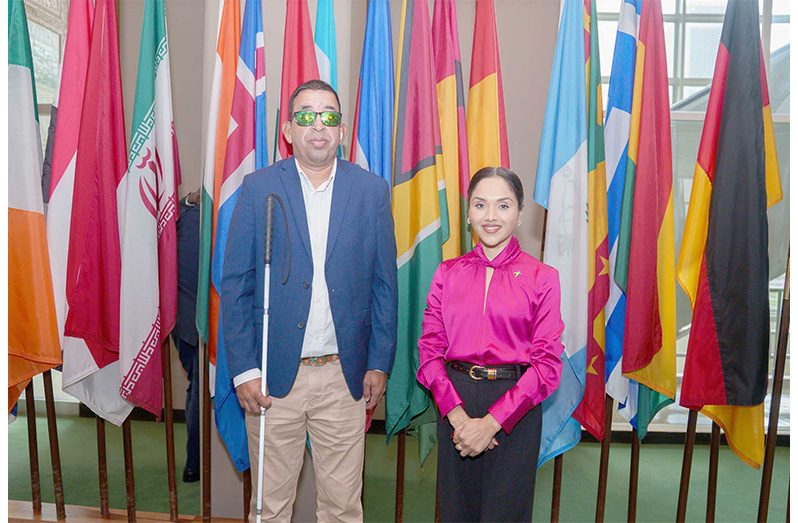ARTIFICIAL Intelligence (AI) holds the potential to transform the world for persons with disabilities (PWDs). These words were shared by Programme Manager of the Guyana Council of Organisations for Persons with Disabilities (GCOPD), Ganesh Singh.
Singh was part of the Guyana delegation, led by First Lady Arya Ali, at the 18th Session of the Conference of States Parties to the UN Convention on the Rights of Persons with Disabilities (CRPD).
In his statement, Singh said this is not a distant hope, but a powerful reality that is already making changes.
“AI-powered tools are helping to bridge the accessibility gap and ensure persons with disabilities have access to opportunities to live a more independent and productive life,” he said, adding, “We’re seeing more persons with disabilities employed, accessing more educational opportunities and becoming more independent as a result of artificial intelligence.”
He pointed out that in Guyana, through the Digital School, PWDs are able to access more tailored lessons. Singh said the Online school is fashioning individualised education plans for all registered students, including those students with disabilities.
The disability advocate also underscored the fact that more persons with disabilities are using AI in their daily jobs.
“Screen readers are improved now, voice activated devices are making a difference in their lives,” Singh expressed.
These examples, according to Singh, illustrate just how artificial intelligence can ensure that PWDs live an independent life. He further noted that AI re-enforces dignity, independence, and participation, core principles of the CRPD.
He said that while there are positives to AI, there are also risks, and highlighted that if AI is developed with biased data, or in a process that is not inclusive or deployed without accessibility standards, there will be problems.
Additionally, on the first day of the conference, Guyana’s First Lady Mrs. Arya Ali, in her speech, underscored that Guyana has taken decisive steps to safeguard the rights of PWDs.
She further mentioned that the Prevention of Discrimination Act and the Persons With Disabilities Act provide the legal foundation to prohibit discrimination in employment, mandate rehabilitation, ensure access to free education and healthcare, and promote participation in cultural and recreational life.
Mrs. Ali noted that Guyana’s Low-Carbon Development Strategy (LCDS) reinforces this commitment, and our government backs this with practical support. This is inclusive of free healthcare and assistive devices, employment and housing opportunities, inclusion in the school system, and life-long public assistance for everyone with permanent disabilities.
She added that the Disability Support Unit was created to ensure inclusion and no discrimination.
“Under our One Guyana initiative, youth with disabilities are provided with the tools and resources to pursue economic opportunities,” the First Lady pointed out,
“We recently launched the Centre for Equity, Opportunity and Innovation that currently employs scores of persons with disabilities, and provides technical, vocational and business development training.”
The First Lady further said the combined efforts of the Mahaica Learning Lab, Board of Industrial Training, Business Centre and the Open Doors Vocational Centre offer free skills training for persons with disabilities.
Mrs. Ali noted that Guyana is home to the Regional Disability Diagnostic and Treatment Centre, which offers early diagnoses for children with disabilities.
She posited that in recent years, hundreds of persons with disabilities have received house lots from the Government, while President Dr. Irfaan Ali’s Men on a Mission programme has built homes and provided construction materials for persons with disabilities.
“A society is judged by how it treats its most vulnerable. Guyana is proud of our efforts, as we believe that the most effective way to give true meaning to the Convention is through education, empowerment, and engagement. These are the pillars upon which we will continue to build a future where the rights of all persons with disabilities are realised,” Mrs. Ali concluded.




.jpg)









